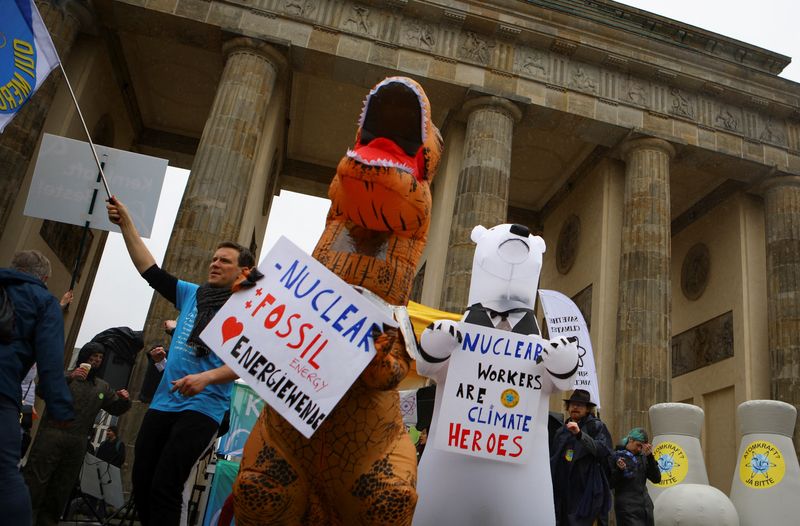By Riham Alkousaa
BERLIN (Reuters) - Germany will pull the plug on its last three nuclear power stations by Saturday, ending a six-decade programme that spawned one of Europe's strongest protest movements but saw a brief reprieve due to the Ukraine war.
The smoking towers of Isar II, Emsland and Neckarwestheim II reactors were to shut forever by midnight on Saturday as Berlin enacts its plan for fully-renewable electricity generation by 2035.
Following years of prevaricating, Germany pledged to quit nuclear power definitively after Japan's 2011 Fukushima disaster sent radiation spewing into the air and terrifying the world.
But the final wind-down was delayed last summer to this year after Moscow's invasion of Ukraine prompted Germany to halt Russian fossil fuel imports. Prices soared and there were fears of energy shortages around the world - but now Germany is confident again about gas supplies and expansion of renewables.
Germany's commercial nuclear sector began with the commissioning of the Kahl reactor in 1961: eagerly promoted by politicians but met with scepticism by companies.
Seven commercial plants joined the grid in the early years, with the 1970s oil crisis helping public acceptance.
Expansion, however, was throttled to avoid harming the coal sector, said Nicolas Wendler, a spokesperson for Germany's nuclear technology industry group KernD.
But by the 1990s more than a third of electricity in the newly-reunited Germany came from 17 reactors.
The next decade, a coalition government including the Greens - who grew out of the 1970s anti-nuclear movement - introduced a law that would have led to a phase out of all reactors by about 2021.
Former Chancellor Angela Merkel's conservative-led governments went back-and-forth on that - until Fukushima.
'ECONOMIC STUPIDITY'
Arnold Vaatz, a former lawmaker for Merkel's Christian Democrats (SPD), said the decision was also intended to sway a state election in Baden Wuerttemberg where the issue was playing into the hands of the Greens.
"I called it the biggest economic stupidity by the party since (it was first in government it) 1949 and I'm sticking to that," Vaatz, one of only five conservative lawmakers who opposed the exit bill, told Reuters.
The last three plants contributed only around 5% of electricity production in Germany in the first three months of the year, according to the economy ministry.
And nuclear power made up just 6% of Germany's energy production last year, compared to 44% from renewables, data by the federal statistics office showed.
Still, two thirds of Germans favour extending the lifespan of reactors or connecting old plants back to the grid, with only 28% backing the phase-out, a survey by the Forsa institute showed earlier this week.
"I think this is certainly fed to a large extent by the fear that the supply situation is simply not secure," Forsa analyst Peter Matuschek told Reuters.
GRAPHIC: German energy sources https://www.reuters.com/graphics/GERMANY-ENERGY/NUCLEAR/zgpobjymavd/chart_eikon.jpg
The government says supply is guaranteed after the nuclear phase-out and that Germany will still export electricity, citing high gas storage levels, new liquid gas terminals on the north coast and renewable energies expansion.
However, nuclear power proponents say Germany will have to go back to nuclear eventually if it wants to phase out fossil fuels and reach its goal of becoming greenhouse gas-neutral across all sectors by 2045 as wind and solar energy will not fully cover demand.
"By phasing out nuclear power, Germany is committing itself to coal and gas because there is not always enough wind blowing or sun shining," said Rainer Klute, head of pro-nuclear non-profit association Nuklearia.
With the end of the atomic power era, Germany has to find a permanent repository for around 1,900 highly radioactive casks of nuclear waste by 2031.
"There are still at least another 60 years ahead of us, which we will need for the dismantling and the long-term safe storage of the remnants," said Wolfram Koenig, head of the Federal Office for the Safety of Nuclear Waste Management (NYSE:WM).
The government also acknowledges that safety issues remain given that neighbours France and Switzerland still depend heavily on nuclear power.
"Radioactivity does not stop at borders," said Inge Paulini, head of Germany's Radiation Protection Office, noting that seven plants in neighbouring countries were less than 100 km (62.14 miles) from Germany.
